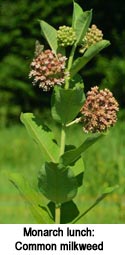|









|
Iowa State Research Backs Cornell - Bt Pollen Hurts Monarchs  (22 August - Cropchoice News) -- Researchers at Iowa State University have published results of their work that indicate that monarch butterflies can be killed by pollen from Bt corn. The research was conducted under more field-like conditions than the Cornell study which made waves last year. (22 August - Cropchoice News) -- Researchers at Iowa State University have published results of their work that indicate that monarch butterflies can be killed by pollen from Bt corn. The research was conducted under more field-like conditions than the Cornell study which made waves last year.
In 1998 and 1999, Iowa State scientists Laura Hansen Jesse and John Obrycki planted different Bt corn varieties. They surrounded the fields with potted milkweed plants (monarch food), allowing them to be dusted by drifting Bt pollen. They took the milkweed into the lab and then let monarch larvae of different ages feed on the plants.
Based on how the lab monachs fared (not very well), the scientists predict that lethal levels of Bt pollen could accumulate on milkweed plants up to 10 meters (11 yards) from the edge of a biotech field. The effects were more pronounced at 3 meters (10 feet) or less. The study also looks at whether Bt pollen may injure some larvae without killing them. According to the scientists, if Bt interferes with the butterfly's storage of fats, it "could reduce their ability to reach Mexico" (the southern stop on the monarch's migration).
While work remains to be done in further quantifying the effects of Bt pollen on monarchs, the study is another factor farmers may want to consider, especially in areas where corn borer pressure is low. Hansen and Obrycki say "in 1995, only 2.2% of the corn in Iowa was treated with broad spectrum insecticides for the suppression of European corn borer... Thus, the widespread planting of transgenic corn represents a potentially significant novel mortality factor for non-target species near agricultural fields." In other words, the research suggests that it's probably not worth trading damage to monarch populations for control of a relativelty minor pest. Not to mention the fact that markets for biotech are not certain.
The Biotechnology Industry Organization (BIO), the trade group bankrolled by big industry dollars, claims that it is unimpressed. But BIO was very fast to dispatch a press release attacking the Iowa State scientists. The group, which strongly favors high tech fees, cites 1999 Bt planting figures (from before the 2000 planting downturn), claiming that overall monarch populations are increasing at the same time as the "increase" in Bt acreage.
Stay tuned. The EPA has called for more study of Bt effects on monarchs as well as other lepidoptera that feed on or near Bt crops, including the Karner blue butterfly, which is considered endangered.
SOURCE: Oecologia, BIO
|



